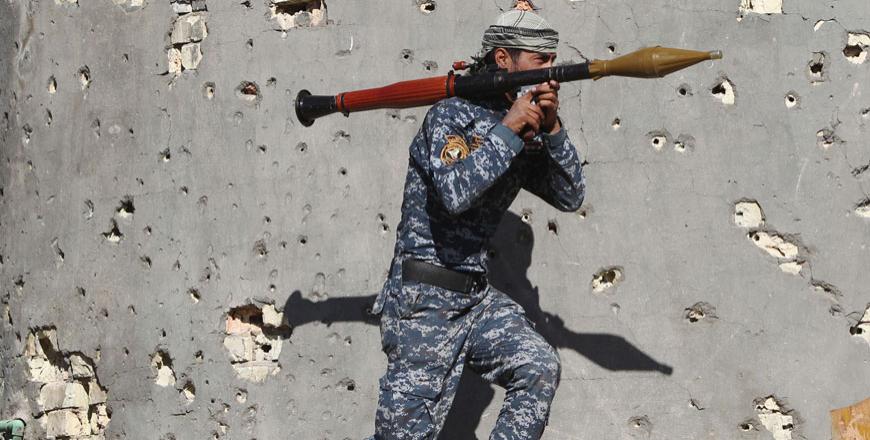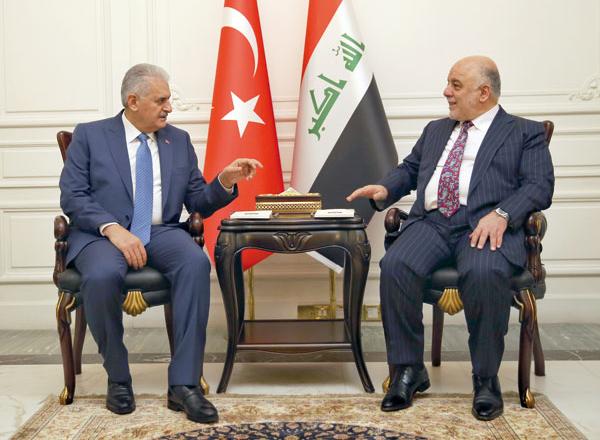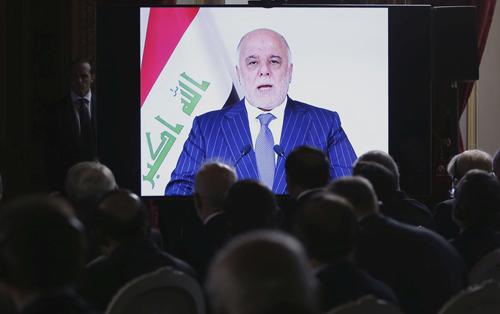You are here
Turkey defends ground troops in Iraq as war escalates
By Reuters - Dec 07,2015 - Last updated at Dec 07,2015

An Iraqi security forces member takes combat position as he carries an RPG in the rural town of Husayba in the Euphrates Valley, seven kilometres east of Ramadi, on Monday (AFP photo)
ISTANBUL/ERBIL — Turkey said on Monday it would not withdraw hundreds of soldiers who arrived last week at a base in northern Iraq, despite being ordered by Baghdad to pull them out within 48 hours.
The sudden arrival of such a large and heavily armed Turkish contingent in a camp near the frontline in northern Iraq has added yet another controversial deployment to a war against Daesh militants that has drawn in most of the world's major powers.
Ankara says the troops are there as part of an international mission to train and equip Iraqi forces to fight against the Daesh terror group. The Iraqi government says it never invited such a force and will take its case to the United Nations if they are not pulled out.
Washington, which is leading an international coalition against Daesh that includes Turkey, Arab states and European powers like Britain and France, has told Ankara and Baghdad to resolve the standoff, and says it does not support deployments in Iraq without Baghdad's consent.
The Turkish troops’ presence is an embarrassment for Iraqi Prime Minister Haidar Abadi, under strong pressure from powerful Iran-backed Shiite political groups to kick them out.
Shiite parties linked to militia groups armed and funded by Iran have also complained about US plans to station special forces in Iraq to conduct raids and guide bombs against Daesh. Political pressure on Abadi could make those plans more difficult to carry out.
Political analysts saw last week’s deployment in northern Iraq by Turkey, which has the second biggest army in NATO, as a bid to assert its influence in the face of increased Russian and Iranian involvement in Syria and Iraq.
“Turkey seems to be angling to prove to the Russians and Iranians that they will not be allowed to have either the Syrian or Iraqi war theatres only to themselves,” said Aydin Selcen, former consul general of Turkey in Erbil, the capital of Iraq’s autonomous Kurdish region.
Our duty
The troops arrived on Thursday with tanks and armoured personnel carriers at a camp in territory held by Iraqi Kurds near the Daesh-held northern Iraqi city of Mosul. Ankara said they were there to help protect a training mission close to the front line.
“It is our duty to provide security for our soldiers providing training there,” Turkish Foreign Minister Mevlut Cavusoglu said in an interview on Turkey’s Kanal 24 television.
“Everybody is present in Iraq ... The goal of all of them is clear. Train-and-equip advisory support is being provided. Our presence there is not a secret,” he added.
Abadi has called the Turkish deployment a violation of Iraqi sovereignty. Government spokesman Saad Al Hadithi said Iraq was still waiting for Turkey to respond officially.
“In case we have not received any positive signs before the deadline we set for the Turkish side, then we maintain our legal right to file a complaint to the Security Council to stop this serious violation to Iraqi sovereignty,” he said.
A senior Turkish official said Baghdad’s objections had come as a surprise: “There was no single development... that happened without informing the central government.”
“The military personnel for training will stay. Not because we want them [there] particularly but because there is a demand from the Iraqi side. The discussion with the central government still continues,” the official told reporters.
He said the total number of Turkish troops across Iraq was much less than 1,000 soldiers, with some having arrived from Turkey and others sent to the base from other parts of Iraq.
Daesh militants overran Mosul, Iraq’s main northern city and home to around 2 million people, in June 2014. An expected counter-offensive by Iraqi forces has been repeatedly postponed because they are involved in fighting elsewhere.
The US-led coalition has been staging air strikes on Daesh bases in both Iraq and Syria for more than a year.
Russia joined the regional conflict with air strikes of its own on Syria two months ago, and like Iran is allied to Syria’s President Bashar Assad, who is opposed by Turkey, the United States and their allies. Turkey shot down a Russian warplane last month, causing a breakdown in relations with Moscow.
Iraqi ultimatum
Brett McGurk, US President Barack Obama’s envoy to the global coalition to counter Daesh, said on Twitter that Washington did not support missions in Iraq without permission of Baghdad, which he said also applied to US missions there.
The camp occupied by the Turkish troops is being used by a force called Hashid Watani, or national mobilisation, made up of mainly Sunni Arab former Iraqi police and volunteers from Mosul.
It is seen as a counterweight to Shiite militias that have grown in clout elsewhere in Iraq with Iranian backing, and was formed by former Nineveh governor Atheel Al Nujaifi, who has close relations with Turkey. A small number of Turkish trainers were already there before the latest deployment.
The government of Iraq’s autonomous Kurdish region, whose security forces control the area where the Turks are deployed, backed up Ankara’s explanation: Thursday’s deployment was intended to expand the capacity of the training base, said Safeen Dizayee, Kurdish government spokesman.
“The increase of personnel requires some protection.”
Although Turkey is strongly suspicious of Kurds in Syria, it has good relations with Iraq’s Kurdish leader Massoud Barzani.
“Turkey, working through the Nujaifis and the Barzanis, is trying to establish its own sphere of influence in northern Iraq,” said Aaron Stein, senior fellow at the Atlantic Council.
Related Articles
BAGHDAD — Turkish Prime Minister Binali Yildirim commenced a two-day visit to Iraq Saturday, the first since the two governments quarreled o
Turkey's President Recep Tayyip Erdogan on Thursday said it was out of the question that Turkish troops would withdraw from Iraq after Baghd
BAGHDAD — US Defence Secretary Ash Carter’s push for Iraq to let Turkey play a role in the battle to retake Mosul from the Daesh terror grou













